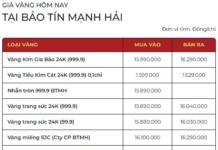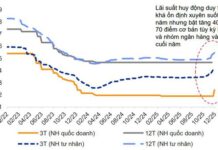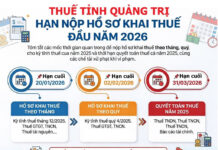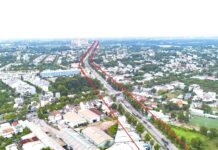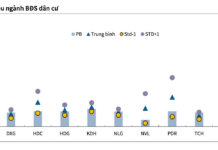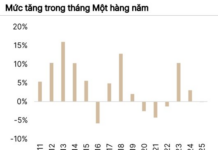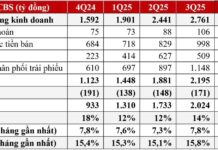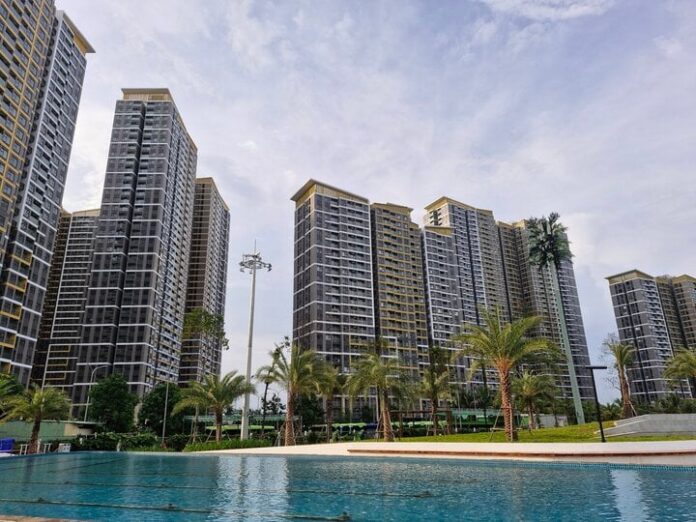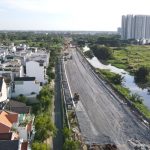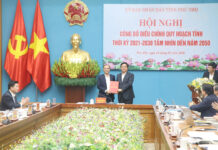Many homebuyers in Ho Chi Minh City are facing difficulties and delays in their transactions due to the local tax department’s inability to process their paperwork for determining financial obligations. The issue stems from the city’s pending release of adjusted land prices following the enactment of the 2024 Land Law.
Thu Thao, a resident of Binh Chanh district, shared her concern after placing a deposit on an apartment in a local project. She had agreed to borrow money from the seller and mortgage the purchased apartment. However, with the uncertainty surrounding the timeline for completing the necessary procedures, her loan process is stalled, while the seller urgently needs the funds to repay their bank loan.
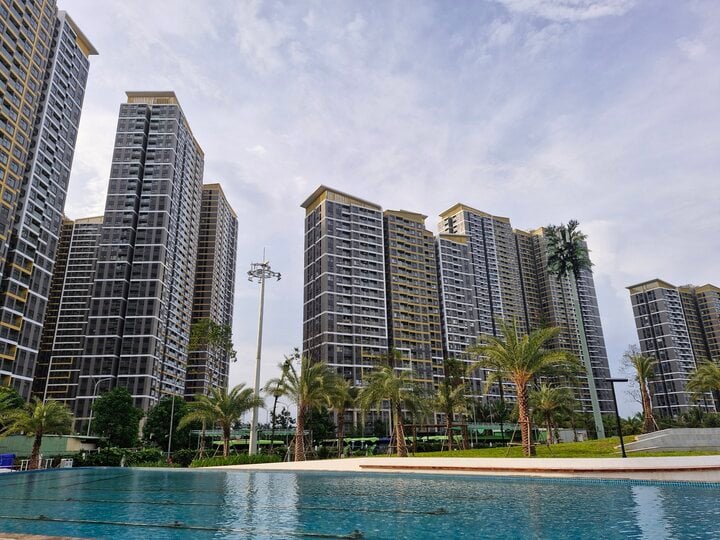
Real estate prices in Ho Chi Minh City are showing signs of increase following news of the city’s upcoming adjusted land prices. (Photo: H.Linh)
Thanh Tan from Thu Duc City is facing a similar situation after signing a contract to sell his apartment for over VND 2.7 billion in the Him Lam Phu An apartment building. While the sale procedures have been completed and the title transferred, Tan received a notification from the tax authorities last August 8, informing him that they had received his paperwork but could not provide a timeline for processing due to the recent enactment of the Land Law and pending guidance from the tax office.
Tan mentioned that he needed to sell his property to repay a nearly VND 2 billion loan to the bank. As the buyer also needed to borrow from the bank, Tan agreed to a loan freeze, allowing the buyer to use the purchased apartment as collateral. While the bank approved the loan, the funds would remain frozen until the paperwork was completed.
“I’m frustrated and worried because the paperwork is stuck at the tax stage, and I don’t know when it will be resolved,” Tan said. “We can’t settle our debts with the bank, and we have to spend more money on renting since we’ve already handed over the apartment to the buyer. The buyer is also concerned about potential disputes, so I had to make an additional notarized commitment stating that I’ve received the sale proceeds.”
The Gò Vấp District Tax Office also issued a notice on August 7 regarding the determination of financial obligations for real estate transactions, stating that they could not guarantee the scheduled response time for applications submitted after August 1. The reason cited was the pending decision from the Ho Chi Minh City People’s Committee to adjust the land price framework, which took effect on August 1.
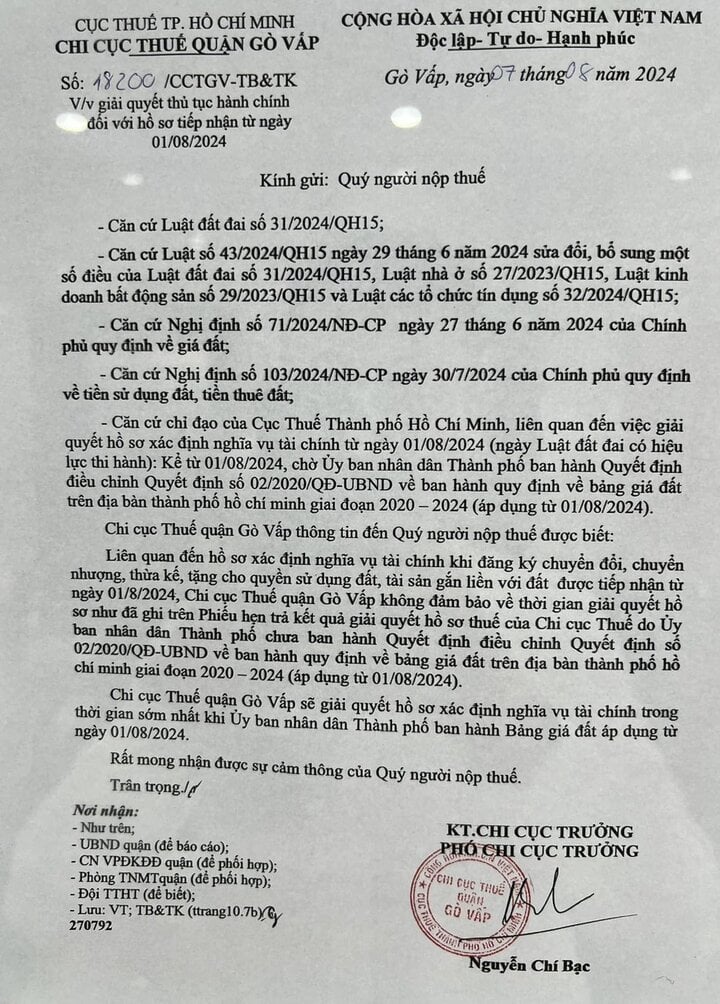
Notice from the tax department regarding the processing of land tax procedures after August 1, following the enactment of the new Land Law.
Addressing the question of the tax department’s inability to finalize tax rates based on the current land price framework, Dao Quang Duong, Deputy Head of the Economic Land Department of the Ho Chi Minh City Department of Natural Resources and Environment, acknowledged that this issue is not unique to Ho Chi Minh City but a challenge faced by many provinces and cities.
Regarding the calculation of financial obligations related to land during the transition period from August 1 to the implementation of the new land price framework in Ho Chi Minh City, Mr. Duong stated, “We are working with relevant departments to submit a proposal to the city for reporting to the central government for guidance.”
Mr. Duong also assured that, according to reports from the 22 branches of the Land Registration Office in the districts and Thu Duc City, land registration activities have proceeded normally in recent days. If the change in land use purpose complies with the planning, it will be implemented as per regulations.
Concerning the draft adjusted land price framework that the Department of Natural Resources and Environment proposed at the end of July, intending to take effect on August 1 but has not been implemented, Mr. Duong stated that the department is collaborating with relevant agencies to finalize it before introducing a more refined land price framework.
“There are opinions that the adjusted land price framework will increase dramatically,” Mr. Duong said. “However, the department affirms that there will be no sudden increase but rather a reflection of the actual land prices in Ho Chi Minh City, in accordance with Article 200 of the Land Law, and ensuring a balance of interests between land users, the state, and investors.”
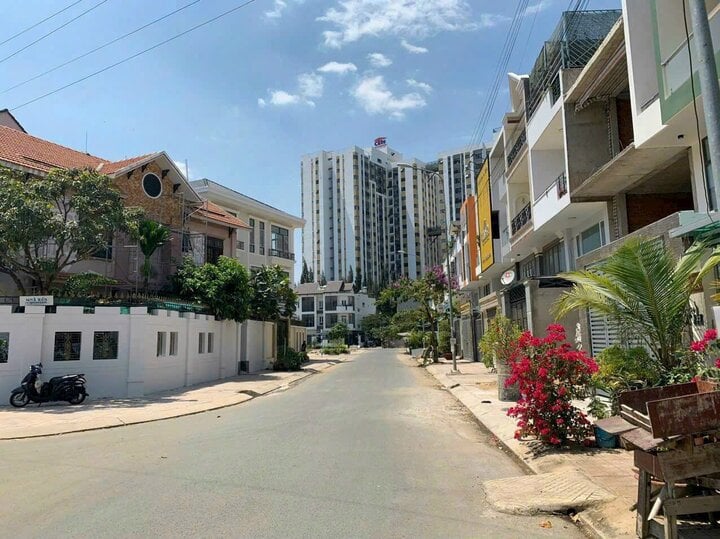
According to regulations, the new land price framework of Ho Chi Minh City must be approved by the People’s Council before implementation. (Photo: H.Linh)
Compared to the current land price framework stipulated in Decision 02 by the Ho Chi Minh City People’s Committee in 2020, the proposed adjusted framework shows a significant increase of 5-10 times in central districts and up to 20-35 times, or even 50 times, in specific areas of outlying districts like Hoc Mon, Cu Chi, Binh Chanh, and Thu Duc City.
Lawyer Nguyen Van Duc, Director of Kinh Luan Law Company in Ho Chi Minh City, emphasized that after the Department of Natural Resources and Environment formulates the adjusted land price framework and consults with relevant units, a thorough assessment of its socio-economic impacts is necessary. He also pointed out that, according to regulations, the framework must be approved by the Ho Chi Minh City People’s Council before coming into effect.
Le Hoang Chau, Chairman of the Ho Chi Minh City Real Estate Association, noted that the proposed land price framework would benefit residents whose land is subject to compulsory acquisition as they would receive more reasonable compensation and support for resettlement. Additionally, the state budget revenue from land would increase, and the land rent differential would be handled more appropriately, in line with the principle of the state regulating the additional value generated from land without the investment of the land user.
Mr. Chau acknowledged the existence of various inconsistencies, such as “dual land prices” or “dual prices” in real estate and housing transactions. However, he cautioned that immediate implementation of the proposed land price framework could lead to unintended consequences, particularly impacting those who need to change the purpose of land use and triggering a chain reaction of rising land and housing prices.
Comprehensive regional connectivity
In addition to building strong physical infrastructure, Ho Chi Minh City needs to strengthen its soft connections with other provinces in the region in order to promote economic development. This includes prioritizing the training of skilled workforce and ensuring access to quality healthcare.






